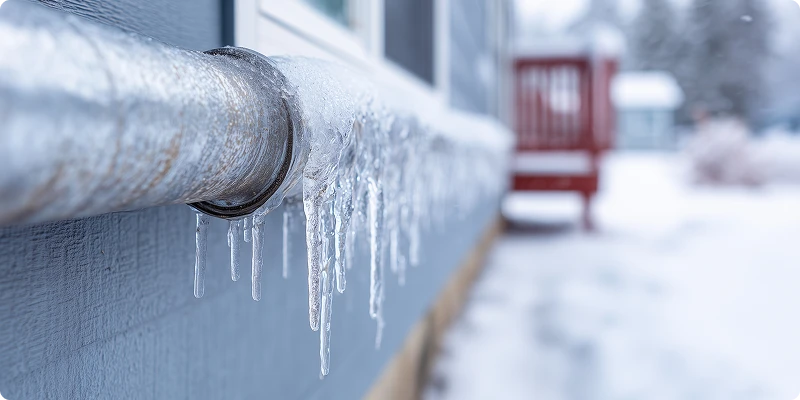How to prevent frozen pipes in your home
Posted December 4th, 2025 by SimpliSafe

As the temperature begins to drop, the risk of your pipes freezing increases - which carries a number of risks. Whether that’s being left without running water, your home flooding, and having to repair water damage, dealing with the consequences of a burst pipe during the harsh winter months certainly isn’t preferable. This article will tell you everything you need to know about how to prevent frozen pipes in your home.
Install a temperature sensor
One of the most effective ways to stop your pipes freezing is to set up a Temperature Sensor in your home. If your home drops below 5°C, the temperature sensor will trigger an alarm - alerting you to increase it before your pipes burst. When paired with our monitoring plan, our monitoring centre will alert you immediately if you’re away from home.
Get your boiler serviced annually
To ensure that your home is prepared for winter, it’s important to get your boiler serviced each year - ideally during warmer months. If your boiler isn’t working as it should, you risk your pipes falling victim to the cold. The person servicing your boiler will be able to recognise small issues before they escalate - saving you from future hassle.
Keep your pipes insulated
Insulation is one of the easiest and most cost-effective ways to prevent your pipes from freezing. This includes any outside pipework, or pipes that are situated in colder areas of your home. It’s also important to pay close attention to your water tank, which can be one of the main causes of a burst pipe. Head to your local DIY store and pick up some pipe wrap, foam pipe sleeves, a tank jacket, and any other insulators you can get your hands on, to keep your home safe and warm during colder months.
Switch off the water whilst you’re away
Heading off on holiday? Make sure to switch your water supply off at the stopcock beforehand, which will reduce the possibility of water freezing, and the pipe bursting. For an added layer of protection, you could drain the system by running the taps until they’re empty. Just don’t forget to close them when you’re finished!
Look out for leaking taps
It’s a myth that letting water gradually trickle out of your tap prevents pipes from freezing - in fact, it does the opposite. If you forget to turn your tap off, or if it’s broken and leaking, you risk your drain becoming frozen. This, in turn, can cause the water to back up to your sink - which may result in it overflowing. So, alongside turning your taps off properly when they aren’t in use, make sure to get any broken ones repaired.
Keep the cold out
To keep yourself toasty and warm, as well as protecting your pipes, do everything you can to conserve heat in your home. This might include blocking out the chill by keeping your windows firmly closed, making the heating come on at certain points in the day, or maybe keeping your heating at a constant low temperature throughout the day. If your pipes are situated in colder areas of the house - such as an unheated loft space - keep the hatch open during the day so that the warm air can circulate the entirety of your home.
From ensuring complete home security, to protecting your property from harsh weather conditions, the SimpliSafe system covers all bases. Contact a member of our team today to start building your very own home security system.